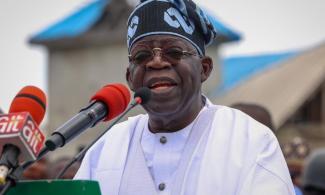
Tinubu's Special Adviser on Special Duties, Communications and Strategy, Mr. Dele Alake, disclosed this during a briefing on Thursday, on the details of presidential intervention on food security, food pricing, and sustainability.
President Bola Tinubu will create and support a National Commodity Board that will review and continuously assess food prices as well as maintain a strategic food reserve that will be used as a price stabilisation mechanism for critical grains and other food items.
Tinubu's Special Adviser on Special Duties, Communications and Strategy, Mr. Dele Alake, disclosed this during a briefing on Thursday, on the details of presidential intervention on food security, food pricing, and sustainability.
Alake explained that through the board, the government will moderate spikes and dips in food prices.
SaharaReporters reports that following the declaration of the removal of subsidy on Premium Motor Spirit (PMS) by President Tinubu on the assumption of office on May 29, 2023, and subsequent economic reforms, the inflation rate has skyrocketed, resulting in high food prices.
Also, insecurity across the country, especially attacks by herders and the destruction of farmlands in the Middle Belt and South East that drove farmers out of their farms have contributed significantly to the food insecurity in the country.
But addressing journalists on how to achieve its plan, the Presidency explained that it has assembled stakeholders from the National Commodity Exchange (NCX), Seed Companies, National Seed Council and Research institutes, NIRSAL Microfinance Bank, Food Processing/Agric Processing associations, private sector holders & Prime Anchors, smallholder farmers, crop associations and Fertilizer producers, blenders and suppliers associations among others to support the intervention effort of President Bola Tinubu.
Reeling out some other measures the government has put in place to ensure food security, Alake said, they will engage the security architecture of the country to protect the farms and the farmers to enable farmers to return to their farmlands without fear of attacks.
As part of immediate intervention strategies, the Presidency said, “We will immediately release fertilizers and grains to farmers and households to mitigate the effects of the subsidy removal.
“There must be an urgent synergy between the Ministry of Agriculture and the Ministry of Water Resources to ensure adequate irrigation of farmlands and to guarantee that food is produced all year round.
“As a country, Mr. President has made it clear that we cannot be comfortable with seasonal farming. We can no longer afford to have farming down times.
“We shall create and support a National Commodity Board that will review and continuously assess food prices as well as maintain a strategic food reserve that will be used as a price stabilisation mechanism for critical grains and other food items.
“Through this board, government will moderate spikes and dips in food prices.
The Presidency noted that the Central Bank will continue to play a major role in funding the agricultural value chain, while they will activate what he called "land banks". "There are currently 500,000 hectares of already mapped land that will be used to increase the availability of arable land for farming which will immediately impact food output."
"President Bola Ahmed Tinubu’s mandate to create jobs for our teeming youth population will be achieved with between 5 to 10 million more jobs created within the value chain, working with the current 500,000 hectares of arable land and the several hundreds of thousands more farmlands to be developed in the medium term," he added.